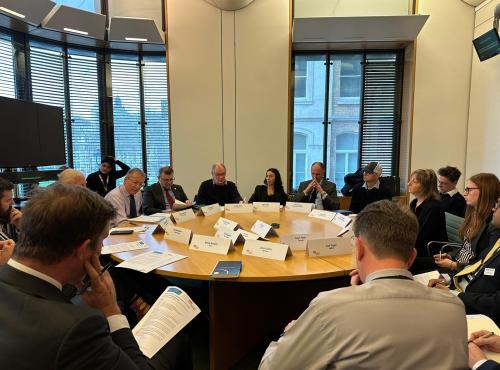In Conversation with Clive Betts MP
Policy Connect was delighted to host Clive Betts MP (Sheffield South East) to speak to an audience of senior figures about the work of the Housing, Communities and Local Government Select Committee.
Since being appointed to the position following the 2010 Election, Mr Betts has established the Committee as one of the strongest voices in Parliament for scrutinising Ministers and senior civil servants on issues ranging from house-building, to planning, to devolution.
In an extensive discussion with Policy Connect’s Chief Executive, Jonathan Shaw, Mr Betts set out his vision for the Committee, with a particular focus on the impact of COVID-19 on local authorities, and his views on the Government’s “Levelling-Up” agenda.
Clive began by noting the United Kingdom’s position as one of the most centralised countries in Europe, with governments of all parties being traditionally distrustful for devolving power and responsibilities to local authorities. Despite this scepticism, he stated that the wider devolution agenda, as well as the rise in Combined Authorities, represented a partial-step forward. He nevertheless noted that devolution deals, such as the recently announced £30 million per year for the Sheffield City Region, did little to address the considerable cuts to local authority budgets since the Great Recession.
Noting the complex and patchwork nature of local government across England, Mr Betts said the evolving nature of devolution was starting to address these historical imbalances, but that more needed to be done to ensure that all regions of the country were treated equally.
Responding to a question regarding the lessons and challenges emerging from COVID-19, Clive spoke about the flaws that the crisis had highlighted. He listed a number of missteps by central government bodies, such as Public Health England failing communicate effectively with local authority officials. Summing up these issues as “Whitehall doesn’t always know best”, Mr Betts added that developing better links between local authorities, central government, and organisations such as Local Enterprise Partnerships would be vital in addressing regional and social imbalances.
The issues associated with adult social care were also discussed, including the enormous financial and social burdens being placed on local authorities as responsibility for this policy area is devolved. Mr Betts noted that the Committee had come to a cross-party consensus on funding adult social care via a ring-fenced surcharge on National Insurance. He explained that the proposal, modelled on the German and Japanese models, would free-up resources for other spending priorities for local authorities. At present, in many areas, he warned that people saw their council taxes going up whilst the quality and provision of local services went down.
Clive also spoke about the future of the planning system and high-street. With regard to the considerable shifts in working and retail habits, Mr Betts noted a fifth of all personal spending was focused on online shopping, considerably higher than many other countries. He said that this change in retail habits had prompted a major shift for high streets, even before COVID-19. He felt that it would be unlikely to see a swing back after the end of the current public health crisis.
With this in mind, the conclusion that less retail floorspace would be needed - but that towns and cities could move towards more entertainment and cultural offerings, and building more city-centre residential properties to alleviate demands on the Green Belt.
He said that these factors would demand reforms to town planning laws, as well as changes to the business rate system. He added that a Digital Sales Tax would also serve to address the discrepancy between physical and online retailers.
Clive took a range of questions from Policy Connect members from across the construction, planning and skills sectors, adding that the work of the Committee would continue to press the Government on current and long-standing issues affecting the planning and retail sectors.
Policy Connect is continuing a range of research and events on many of the issues raised at the roundtable, including research into green heat as part of the ‘Net Zero’ targets, Levelling-Up manufacturing, and local data strategies.



